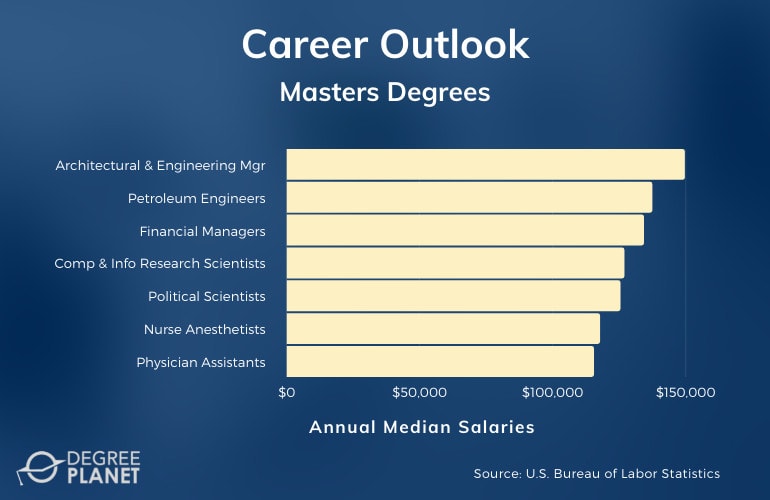If you are thinking about going back to school to earn your master’s degree, you may be wondering what the most useful master’s degrees are. Trying to choose what type of degree to get can feel like a big decision.

Some fields may have more employment opportunities than others, and some jobs may pay higher salaries than others.
Editorial Listing ShortCode:
Today, we will be exploring some of the most valuable masters degrees for the current job market.
What Are the Most Useful Masters Degrees?
Some of the most valuable graduate degrees include business administration, computer science, economics, engineering management, and finance.
Others are healthcare administration, nursing, petroleum engineering, political science, physician assistant studies, and statistics. These are all growing fields in which there are currently many job openings and there will likely continue to be many job openings in the future. In some cases, career paths in these fields are likely to provide high salaries and stable employment.

In most of these fields, you could find employment with just a bachelor’s degree, but earning your master’s degree may enable you to qualify for higher-paying positions or for positions in management. Whether you are looking to completely change careers or simply to expand your knowledge and skills in your current career, any of these most in demand masters degrees could potentially be helpful to you.
They each provide different advantages, so the best choice for you depends on your goals and interests. Next, we’ll take a look at some of the degrees that are considered the most useful. Career, salary, and job growth information has been provided by the Bureau of Labor Statistics (BLS).
Select the program that most interests you to jump to that section of the guide:
- Master of Business Administration
- Master of Science in Computer Science
- Master of Science in Economics
- Master of Science in Engineering Management
- Master of Science in Finance
- Master of Science in Healthcare Administration
- Master of Science in Nursing
- Master of Science in Petroleum Engineering
- Master of Arts in Political Science
- Master of Science in Physician Assistant Studies
- Master of Science in Statistics
You can explore these programs to see which ones best match your interests and goals.
Master of Business Administration (MBA)

Annual Median Salary: $102,450
Job Growth: 9%
In a Master of Business Administration (MBA) program, you will likely study business communication, strategy, law, operations, and ethics. Other common topics of study are leadership, management, economics, finance, accounting, and marketing.
Some MBA programs may allow you to choose a concentration within the program to customize your education. Common concentrations include finance, data analytics and decision-making, entrepreneurship, and marketing.
Editorial Listing ShortCode:
With an MBA you might become a manager in advertising, promotions, marketing, finance, human resources, public relations, fundraising, or sales. You might also pursue a job as a top executive, financial analyst, or management analyst.
Management, business, and financial occupations include some of the highest paying jobs listed by the Bureau of Labor Statistics. An MBA can be a very versatile degree. Learning how corporations and businesses operate can help prepare you for a variety of different careers.
Master of Science in Computer Science

Annual Median Salary: $97,430
Job Growth: 13%
Earning a Master of Science in Computer Science can give you the opportunity to study a variety of topics in computer science.
Common topics include software engineering, programming, cybersecurity, computer networking, system architecture, cloud computing, and distributed systems. Earning this degree can also help you become proficient in a variety of coding languages.
Editorial Listing ShortCode:
Many graduate degree programs in computer science also require the completion of a thesis or a capstone project to demonstrate your skills. Possible career options with this degree are computer and information research scientist, computer network architect, computer programmer, and computer systems analyst.
In the modern world, knowledge of technology can be useful in almost any industry. All kinds of businesses need technologically adept employees to do everything from developing websites to maintaining network security. Computer and information technology occupations tend to be high paying, and this field is expected to experience rapid job growth over the next decade.
Master of Science in Economics

Annual Median Salary: $105,630
Job Growth: 13%
With a Master of Science in Economics, you could pursue work as an economist for a business or government agency. Economists help businesses determine how they will be financially impacted by things like inflation or changes in supply and demand so they can adjust their operations accordingly.
The study of economics can be applied to almost any industry, making an economics degree quite versatile on the job market. In addition to working as an economist, you could pursue a job in some other financially-oriented position. You might become a budget analyst, a financial analyst, or a market research analyst.
Editorial Listing ShortCode:
Common topics studied in this field are microeconomics, macroeconomics, econometrics, data analytics, international and development economics, and environmental and energy economics. Many master’s degree programs in economics are research-oriented and require the completion of a thesis.
Master of Science in Engineering Management

Annual Median Salary: $152,350
Job Growth: 4%
A Master of Science in Engineering Management can be useful for pursuing a career as an architectural and engineering manager or as a construction manager.
While employment in these occupations is not growing rapidly, there are already a high number of job openings in these positions. The demand for engineering managers is expected to remain steady over the next decade.
Editorial Listing ShortCode:
A degree in engineering management is useful because many positions in this field provide high and stable salaries. Graduate degree programs in engineering management are often aimed at students who already have a background in some kind of engineering.
As compared to an engineering degree, the focus of an engineering management degree is less on technical knowledge and more on how to coordinate teams to work together efficiently. Common topics of study for this degree are cost and quality control, marketing, organizational leadership, logistics, production, and manufacturing.
Master of Science in Finance

Annual Median Salary: $131,710
Job Growth: 17%
A Master of Science in Finance can be helpful in almost any business or financial occupation. Possible careers that can be pursued with this degree include financial manager, budget analyst, financial examiner, and personal financial advisor.
A degree in finance has broad applications because businesses in every industry must be able to invest wisely and manage their money well. These jobs generally involve helping companies or private individuals manage their money. Common tasks include looking for ways to cut spending and considering the possible risks and returns of different types of investments.
Editorial Listing ShortCode:
Graduate programs in finance usually include courses in accounting, economics, marketing, investing, portfolio management, statistics, and business administration. Some programs will allow you to choose a specialization in something like corporate finance, real estate, or risk management. This could be useful if you have a very specific career path in mind.
Master of Science in Healthcare Administration

Annual Median Salary: $101,340
Job Growth: 32%
The most common career option for someone with a Master of Science in Healthcare Administration is to become a medical and health services manager. Healthcare administration is one of the most valued masters degrees because this field is growing very rapidly. Medical and health services managers are often employed by hospitals, outpatient care centers, physician’s offices, and residential care facilities.
Some different types of medical and health services managers include nursing home administrators, clinical managers, and health information managers. Common tasks in these positions include creating work schedules and ensuring that equipment is up-to-date and facilities are compliant with current laws and regulations.
Editorial Listing ShortCode:
A master’s degree in healthcare administration can help you develop the knowledge and skills needed to take on these responsibilities. While earning this degree, you may take courses in law and ethics, economics and finance, managerial epidemiology, operations, strategic management, and more.
Master of Science in Nursing (MSN)

Annual Median Salary: $123,780
Job Growth: 45%
A Master of Science in Nursing would be an appropriate degree for anyone wanting to become an advanced practice registered nurse (APRN). Possible careers with this degree are nurse anesthetist, nurse midwife, and nurse practitioner.
APRNs can take on responsibilities beyond those of a registered nurse, such as diagnosing illnesses or prescribing medications. Most MSN programs are intended for students who are already registered nurses and who have bachelor’s degrees in nursing. Coursework typically includes pathophysiology, pharmacology, advanced health assessment, ethical practice, health care policy, nursing research, and more.
Editorial Listing ShortCode:
These programs usually require a clinical experience to graduate as well. You’ll also need to take a national exam and meet other requirements to become licensed as an APRN. Licensing requirements for APRNs vary by state.
Nurses are currently in high demand, with employment of nurses only expected to increase over the next decade. If you are a registered nurse, learning more advanced and specialized skills in an MSN program can help prepare you to meet this demand.
Master of Science in Petroleum Engineering

Annual Median Salary: $130,850
Job Growth: 8%
A Master of Science in Petroleum Engineering can help prepare you to work as a petroleum engineer. Petroleum engineers figure out the most efficient and cost-effective ways to remove oil and gas from underground to meet society’s energy needs.
Some different types of petroleum engineers include completions engineers, drilling engineers, production engineers, and reservoir engineers. Petroleum engineers may do some of their work in an office, but the job typically requires visits to drilling sites.
Editorial Listing ShortCode:
A Master of Science in Petroleum Engineering is one of the highest paying masters degrees, and the field usually provides stable employment. Petroleum engineering graduate programs typically cover reservoir engineering, petroleum fluid properties, well logging and drilling, and how to evaluate petroleum formations.
Some programs also include coursework on environmental sciences and renewable energy, so students will be prepared to address environmental concerns. Many petroleum engineering graduate programs also require the completion of a thesis, but non-thesis options are available as well.
Master of Arts in Political Science

Annual Median Salary: $122,510
Job Growth: 9%
A Master of Arts in Political Science is one of the most useful degrees for pursuing a career as a political scientist. Political scientists analyze the operations of the government. They may work for either public or private organizations, usually as policy analysts or consultants. A degree in political science can also be useful if you want to follow politics in a news media career.
Political science degree programs are often interdisciplinary in nature, including coursework in economics, law, sociology, history, statistics, and more. Different branches of political science include comparative politics, national politics, international relations, and political theory. Your degree program may allow you to choose a concentration in one of these subfields.
Editorial Listing ShortCode:
Many political science graduate programs require the completion of a thesis. It is also common to have students participate in internships so they can network with others in the field and gain real-world work experience.
Master of Science in Physician Assistant Studies

Annual Median Salary: $121,530
Job Growth: 31%
A Master of Science in Physician Assistant Studies is one of the most valued masters degrees because there are many job openings for physician assistants. As with other healthcare professions, employment in this field is expected to grow rapidly within the next decade.
Physician assistants may find employment in hospitals, outpatient care centers, or physician’s offices. They perform tasks such as diagnosing illnesses and injuries and prescribing medicines under the supervision of a physician.
Editorial Listing ShortCode:
While earning this degree, you will likely take courses in human anatomy and physiology, pathophysicology, medical ethics, physical diagnosis, and pharmacology. These courses typically include classroom, laboratory, and clinical instruction.
Your studies can help you develop critical thinking and interpersonal skills, such as how to collaborate with other professionals and an awareness of cultural diversity among patients. A career as a physician assistant can be very rewarding because it provides opportunities to solve problems and care for people in a very direct way.
Master of Science in Statistics

Annual Median Salary: $95,570
Job Growth: 35%
The Bureau of Labor Statistics currently projects that mathematicians and statisticians will experience rapid job growth over the next decade. This makes this an opportune time to earn a master’s degree in statistics.
More businesses and organizations are trying to make informed decisions based on actual data, and they are hiring statisticians to help them analyze the information correctly. Statisticians can find jobs in government, education, healthcare, and many other industries, and they often have stable employment.
Editorial Listing ShortCode:
Common topics of study for this degree are statistical modeling, time series analysis, stochastic processes, statistical consulting, data science, and data management. Some courses in statistics degree programs are highly theoretical, while others focus more on the application of knowledge. It is also common for master’s degree programs in statistics to require the completion of a thesis.
Careers & Salaries

Many employers in different industries are currently looking for educated employees, and a master’s degree can help you gain their notice.
Hospitals and medical offices are currently in need of physician assistants and nurses to care for patients. Businesses and corporations are looking for statisticians, economists, and financial experts to help them make good use of all their incoming data and information.
Within the field of engineering, there is specifically a need for petroleum engineers, as well as a need for engineers of all kinds who possess effective leadership and management skills. With technology becoming ever more prevalent in daily life, most computer and information technology workers are also in demand, with demand expected to grow over the next few years.
Political science is another field in which there is a growing interest and a need for highly educated workers. According to the Bureau of Labor Statistics, here are some of the most rapidly growing careers and their average salaries:
| Careers | Annual Median Salaries |
| Architectural and Engineering Managers | $152,350 |
| Financial Managers |
$131,710 |
| Computer and Information Research Scientists | $131,490 |
| Petroleum Engineers | $130,850 |
| Nurse Anesthetists, Nurse Midwives, and Nurse Practitioners |
$123,780 |
| Political Scientists | $122,510 |
| Physician Assistants | $121,530 |
| Economists | $105,630 |
| Medical and Health Services Managers | $101,340 |
| Mathematicians and Statisticians | $96,280 |
Some of the jobs listed may require further experience or licensing to obtain, but a master’s degree pertaining to any of these occupations can help you pursue a variety of careers.
What Masters Degree Should I Get?

The type of degree program that is right for you depends on your personal goals and aspirations. No matter your interests, though, there are some common things to consider when making this choice:
- Are you hoping to advance in your current field or change careers completely?
- Is it most important to you to earn a high salary, have a high likelihood of employment, or to work in a field you are passionate about?
- Do you want a generalist degree, such as an MBA, or do you want to study something specialized?
- Do you want to get your education online or in-person? Some degree programs can be completed entirely online, but those that prepare you for hands-on careers, such as nursing, may involve clinical training.
- Do you want to complete a thesis? Some master’s degree programs are very oriented toward academic research, which can be an asset if you want to pursue a career in academia. You may be able to complete you degree faster if there is a non-thesis option, though.
There are many master’s degrees that are in demand and could be good options, depending on what you want to achieve. Talking to other people who have already earned their master’s degrees could help you decide on the best path for you.
Accreditation

Regional accreditation is a process by which colleges and universities are evaluated on the quality of their academic programs. In this process, an outside agency ensures that they meet minimum standards.
Checking for regional accreditation is important because it helps to ensure that you will receive a good education. Attending an accredited university can also make it easier to get financial assistance or to transfer schools if you choose to do so.
Editorial Listing ShortCode:
Most regionally accredited universities name their accrediting agency on their websites, so you can check before applying. To learn more about regional accreditation, you can visit the U.S. Department of Education.
What Makes a Graduate Degree Desirable to Employers?

There are many things that could potentially make a graduate degree desirable to employers. Graduate degree programs that provide hands-on, real-world learning experiences and collaborative projects similar to those you might encounter in the workplace are often desired.
Internships often look good to potential employers. You may also want to choose a graduate program that includes opportunities to conduct research, work on projects, or have other meaningful experiences. These experiences can be valuable to discuss during interviews with potential employers. The exact types of knowledge and experiences that are desirable to employers can vary greatly by industry.
For example, if you’re earning a degree in statistics, coursework in highly theoretical topics might be helpful if you wish to pursue a career in academia. A corporate office might prefer if your coursework focused more on applied statistics, though.
In some cases, a graduate degree may be valuable to employers because it is a legal requirement to do the job in question, as is the case with many healthcare roles. In some professions, a master’s degree is optional, but it may look good to employers as an indicator of advanced knowledge.
What Can You Do with a Master’s Degree?

You can do all kinds of things with a master’s degree, depending on your chosen field. An MBA or an MS in Finance could help prepare you to work in almost any sort of business or corporate job.
A master’s degree in nursing or physician assistant studies could help you pursue a career in a hospital or doctor’s office. A degree in healthcare administration could help you pursue a management career in such a setting.
A master’s degree in computer science is useful for pursuing a career in computer and information technology, such as web developer, network administrator, or programmer.
What Are the Most in Demand Masters Degrees?

Some of the most in demand masters degrees right now are those in healthcare. The Bureau of Labor Statistics currently projects that demand for nurse anesthetists, nurse midwives, and nurse practitioners will grow by 45% over the next decade.
There is a 31% increase projected for physician assistants and a 32%increase projected for medical and health services managers. Master’s degrees in nursing, physician assistant studies, and healthcare administration are some of the most sought-after degrees in the job market.
Statistics is another master’s degree that is in high demand. This field is expected to grow by 35% over the next decade. Some other master’s degrees for which there is a relatively high demand include:
- Engineering management
- Petroleum engineering
- Computer science
- Business administration
- Economics
- Finance
- Political science
These fields are not growing quite as rapidly as healthcare or statistics, but they currently have many job openings and are expected to grow or remain stable over the next decade.
What Are the Most Lucrative Masters Degrees?
The most lucrative masters degrees tend to be those in engineering, especially engineering management and petroleum engineering.
According to the Bureau of Labor Statistics, architectural and engineering managers earn a median annual salary of $152,350. Meanwhile petroleum engineers earn $130,850. In many fields, pay can vary considerably. Financial managers earn a median annual salary of $131,710, but business and financial occupations as a whole have a median annual salary of $76,570.
Editorial Listing ShortCode:
While most financial occupations do pay well, an MBA or an MS in Finance does not necessarily guarantee that you will be able to get the highest-paying jobs in the field. Some occupations do not boast extremely high salaries but do provide stable pay and employment opportunities.
Healthcare workers, such as physician assistants, nurse practitioners, and healthcare administrators do not typically earn as much as those in engineering. Healthcare work does usually provide a very reliable income, though.
Can I Get a Masters in a Different Field?
Yes, there are master’s degree programs that will accept applicants that have bachelor’s degrees in different fields of study than they want to pursue in their graduate studies.

Some universities offer bridge programs in which you can take foundational courses before starting the coursework for the main degree program. This may make it take longer to get your master’s degree, but it is doable. Before applying to a university, you may want to find out what pathways the university has available for prospective graduate students who want to change fields.
Are Masters Degrees Worth It?
Yes, a master’s degree is worth it for many students. Some master’s degrees may be more useful than others in the job market.
When considering going back to school for a master’s degree, you may want to research the employment and salary opportunities that exist for graduates in your chosen degree program. This will help ensure that you get a good return on the investment of time and money you are putting into your education.
Getting Your Master’s Degree Online

If you are interested in earning a master’s degree, there are many options for doing so. Some master’s degrees that currently have good job prospects include business administration, computer science, economics, engineering management, and finance.
Healthcare administration, nursing, petroleum engineering, political science, physician assistant studies, and statistics have good prospects as well. These degree programs are available in online, on-campus, and hybrid formats.
Sometimes even degree programs that involve a lot of hands-on training, such as nursing, will allow you to complete certain academic courses online. Getting a master’s degree online can save you time on commuting and enable you to more easily fit classes into your schedule.
You can start your educational journey today by exploring accredited universities!

